ABSTRACT:
Like any other sector, artificial intelligence has also disrupted the content marketing sector. GPT 3 is already a blazing success, and GPT 4 is all poised to take generative AI to the next level with its quantum leap in language prediction and immense capacities in natural language processing. The next generations of AI will have a higher understanding of the nuances of human language and will be able to produce content with an uncanny resemblance to human-generated content. Microsoft and Google are already in the race for generative conversational AI with the launch of AI-powered Bing and Bard, respectively.
With the rapid pace of AI to generate new content, generative AI is a game changer in the content marketing industry. While the pros and cons of using generative AI are debatable, it is still set to bring a revolution in the content marketing industry. The introduction of AI in content marketing reduces the efforts of marketers to a great extent. But how far the content is trustable - there is a debate on this, considering the current versions.
Generative AI can help users assist in creating content which can be in the form of text, images, videos, and audio. However, AI-generated content's authenticity, quality, and ownership can be questionable. Also, without original content generation, the AI can only repeat and rephrase the already existing content. Too much content generation from AI can cause a dearth of high-quality, original, creative, and authentic content.
Goodfirms’ survey titled ‘Generative AI in Content Marketing: Current Trends and Future Predictions’ attempts to shed light on the current trends and other aspects of the usage of Artificial Intelligence in content marketing. It also aims to give an idea of the future scope of the market.
Table of Contents:
Introduction
Overview of Generative AI
- What is Generative AI?
- How does Generative AI work?
- Generative AI Market Size and Key Market Players
- 45.3% of Businesses are Planning to Use Generative AI
Generative AI in Content Marketing
- Key Generative AI Tools for Content Marketing
- Text-based Generative AI Tools
- Image-Based Generative AI Tools
- Video-Based Generative AI Tools
Benefits of Generative AI in Content Marketing
- Saves Time
- Enhances Scalability
- Increases Cost-Effectiveness
- Improves Efficiency
- Reduces the Burden of Content Marketing Teams
- Complements SEO
Top Applications of Generative AI in Content Marketing
- Text Generation
- Image Generation
- Assist in Editing and Proofreading
- Create Social Media Posts
- Eliminating Writer’s Block
- Translate Content in Different Languages
- Video Script Generation
- Generate a Keyword List
Challenges Associated with Generative AI in Content Marketing
Key Findings
Conclusion
Introduction
Deep learning technologies like artificial intelligence and machine learning have been around for quite some years now. Several industries have leveraged the benefits of these technologies in multiple ways. Generative AI is a segment of AI that can be used for creative tasks and has been gaining popularity for the last couple of years.
Content marketing is one of the many industries that can gain a lot of advantages with the use of generative AI. The capabilities of generative AI to develop content from scratch can reduce the burden of content marketing teams and scale content output. Although the content generated through these tools may have reliability and authenticity issues, generative AI is still set to disrupt the content marketing industry.
Goodfirms’ survey “Generative AI in Content Marketing: Current Trends and Future Predictions” is an attempt to gain insights into the current trends in the generative AI field and applications of AI in content marketing.
Overview of Generative AI
Various generative AI models have been developed previously and are being used by many industries. However, the advent of ChatGPT is a major reason for all the recent buzz created around generative AI. Generative AI models have come a long way from being rule-based systems that followed predeterminers to generate output to today’s modules that use machine learning and deep learning algorithms to generate human-like output.
Trained on massive datasets compared to their predecessors, the modern generative AI models have the potential to revolutionize multiple industries and change the way humans interact with technology.
The accessibility of ChatGPT to people has definitely brought technology like Generative AI to the notice of many, making 2022-23 the year of generative AI. Social media platforms such as Twitter, Facebook, and Instagram are currently flooded with posts related to ChatGPT and Generative AI. ChatGPT has gained immense popularity among tech enthusiasts, content marketers, coders, and businesses that rely on AI-powered conversational agents.
There are also posts related to generative AI’s adverse impact on creative industry jobs and concerns about copyright infringements when the AI uses copyrighted data to generate output.
While still in its infancy, generative AI is gaining immense popularity post the launch of ChatGPT. Goodfirms’ survey revealed that more than half the survey participants were not aware of the concept of generative AI before the advent of ChatGPT.
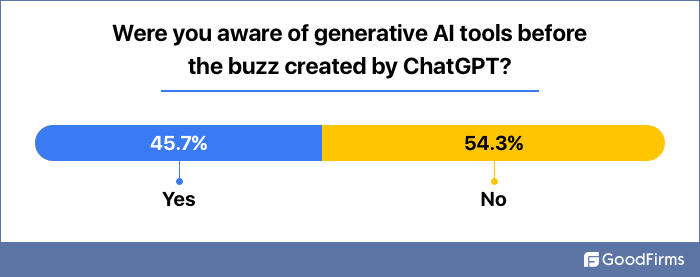
What is Generative AI?
The term generative AI defines a broad category of artificial intelligence models that are capable of creating content in the form of text, images, audio, video, code, or synthetic data from scratch.
Any AI technology that is capable of generating some output on its own can be termed generative AI, unlike the AI technologies that work on processes that involve sorting or differentiation of the data used to train the models. Generative AI works on the tremendous datasets present at its disposal to create unique content.(1)
How does Generative AI work?
Generative AI algorithms are trained to produce outputs that are similar to the data that they are trained on. These AI models require more processing power than conventional AI models. The architecture and features of generative AI models differ according to their purposes. These models are becoming increasingly sophisticated with the maturing industry and technological advancements.
Some of the most popular Generative AI models are:
Generative Adversarial Networks(GAN)
A GAN comprises two neural networks, a discriminator and a generator, that pit against each other to attain equilibrium.
The discriminator network evaluates synthetic data and works to discriminate between real and fake data based on the training given to the model, based on which the generator network produces output.
Transformers-based Models
Transformer-based models are deep learning neural networks that track the relationship in data sequences and learn their context and meaning to generate outputs.
These models work on the mechanism of attention or self-attention. They are one of the most intelligent AI models invented. The invention of transformer-based models led to the replacement of Convolutional and Recurrent neural networks. These models form have a major application in natural language processing models.
Variational AutoEncoders(VAE)
Variational autoencoder is a deep learning encoder that works to describe a probability distribution rather than a single output value for a latent attribute.
The architecture of a VAE includes an encoder and a decoder, where the encoder learns data encoding from a dataset in an unsupervised manner. The decoder works to generate output images similar to the dataset. The major applications of VAEs are data compression and synthetic data creation.
GPT-3
GPT-3 is a deep learning AI model developed by OpenAI. Trained over about 175 billion parameters, the third-generation Generative Pre-Trained Transformer basically uses the data present on the internet to generate outputs.
The model is engineered to generate output that cannot be easily recognized as machine generated on the basis of the prompt given.
GPT4
Open AI released GPT 4, the most advanced deep learning system they have introduced to date, in March 2023.
GPT 4 is engineered to outperform the capabilities of GPT 3.5 and leverages the benefits of being trained on a vast dataset. The model is curated to produce 40% more authentic and factual responses when compared to GPT 3.5.(2)
Generative AI Market Size and Key Market Players
In the year 2021, the generative AI market accounted for USD 8.0 billion. The market is expected to grow at a CAGR of 34.6% from the year 2022 to 2030.(3) The growing application of technologies like high-resolution text-to-image and text-to-video conversions is a major driving factor for the growth of the generative AI industry.
The media and entertainment industry proved to be the major contributor to the market of generative AI. It accounted for around 41.7% of the total generative AI market size in the year 2021. The generative AI market in the media and entertainment industry is also expected to grow at a CAGR of 33.9% by the year 2030.(4)
The shift toward online business during the covid19 pandemic had a positive impact on the generative AI market. Also, the use of generative AI for creating efficient advertisement campaigns will assist the growth of the adoption of generative AI.
While generative AI is still in its early stages, several giant market players have invested in the technology. A few major generative AI companies include OpenAI Inc., Amazon Web Services, Inc., IBM, Google LLC, Synthesia, Rephrase.ai, Microsoft, Adobe, D-ID, MOSTLY AI Inc., and Genie AI Ltd.(5)
Survey and Data Analysis
Goodfirms’ survey ‘Generative AI in Content Marketing: Current Trends and Future Predictions’ is an attempt to gather insights about the use of generative AI in the content marketing industry. The survey also tries to shed light on the benefits and limitations of the incorporation of AI technology in the content marketing strategies of businesses. Goodfirms queried 550 businesses for their view on the adoption of generative content for marketing and the benefits and challenges of implementing machine-generated content. The survey also aims to predict the future trends of generative content.
45.3% of Businesses are Planning to Use Generative AI
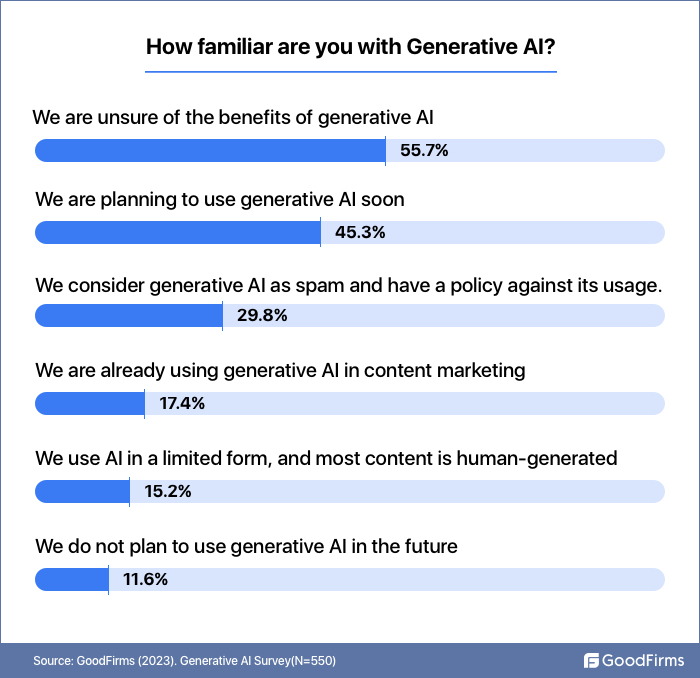
55.7% of businesses are unsure of the benefits offered by generative AI in content creation
While generative AI has tremendous benefits to offer in the field of content creation, businesses are still in a state of confusion due to several reasons. The authenticity of the content generated by these tools can be questionable at times. Also, the impact of AI-generated content on website traffic and ranking on SERP might be a concern. The challenges associated with the implementation of generative AI in content marketing are a reason that around 55.7% of the surveyed businesses are unsure of the benefits of implementing generative AI in content marketing.
Goodfirms’ survey reveals that around 45.3% of the surveyed businesses are planning to implement generative AI in content marketing.
Generative AI tools are improving with growing technological advancements. With the maturing AI industry, the benefits that generative AI offer for content marketing are abundant.
Generative AI tools are capable of creating quality content at a faster pace. Also, these tools are designed to provide content ideas for a good marketing strategy. It is, therefore, evident that the future will see faster adoption of generative AI by numerous companies.
29.8% of the surveyed businesses have a policy against the usage of generative AI
While many businesses are using generative AI, there are those who consider it spam and have a policy against its usage. 29.8% of surveyees expressed concerns regarding the authenticity of the data created by generative AI models and questioned their capacity to adhere to industry guidelines and regulations to ensure that the usage of this technology does not violate any laws. Potential misuse of generative AI for creating fake reviews at scale, bulk messages to spam customers, bulk creation of low-quality content, etc., prevent these businesses from using generative AI, and they rather consider it as spam.
17.4% of surveyees said that they are already using generative AI for content creation
Generative AI tools have been around for quite some time now. While major sections of businesses are still to adopt the technology, there are some businesses that have already implemented these tools in their content marketing strategies.
These companies use generative AI tools for various purposes ranging from generating content ideas to creating the content itself.
15.2% of the survey respondents assert that they use AI in a limited form
Generative AI tools are not particularly meant for generating content, they have other applications in the field of content marketing. With the uncertainty of the authenticity and quality of the content generated by AI tools, there are some businesses that use generative AI tools in a limited format and specific tasks like editing, proofreading, and generating keyword lists. Tools like Grammarly are a great example that can assist in content correction rather than entirely generating a piece of marketing content. Among the survey participants, around 15.2% of businesses said that they use AI in content marketing in a limited form, and the majority of their content is human-generated.
11.6% of businesses do not plan to implement generative content in the near future
Although generative content is eventually gaining popularity, the limitations of AI-generated content stop some businesses from incorporating generative AI tools in their marketing strategies. About 11.6% of the survey participants do not plan to implement generative content in the near future.
Although the challenges associated with generative AI tools are a major reason that hampers the growth of the generative AI industry, there is also a section of businesses that views generative AI tools as the hype and has no future potential.
Around 21.8% of surveyees believe that generative AI is just a hype and does not have any potential for future growth.
Generative AI in Content Marketing
Technologies like artificial intelligence and machine learning have seen tremendous growth during the pandemic. The advances in the generative AI field result in multiple applications of generative AI. Content marketing is one of the many fields that will see a transformation due to the introduction of generative AI.
The ability of generative AI tools to create unique content in a fraction of a second will help marketers save time and create advertising campaigns more efficiently. The survey by Goodfirms attempts to gather insights from business experts about the role of generative AI in content marketing and the future of technology in content marketing.
Key Generative AI Tools for Content Marketing
Although the launch of Chat GPT and the widespread registration of its service appears to be the reason for the increased attention to the generative AI industry, there are several other tools that are being used by marketers for various purposes.
There are multiple generative AI tools designed for performing specific tasks. Some of the tools discussed by the survey participants are as follows.
Text-based Generative AI Tools
Written content forms a major chunk of the marketing content present on the internet. With the tremendous amounts of content present on the internet, unique and quality content has gained a lot of importance.
The demand for rich content can be met by the use of text-based generative AI tools. These tools are designed to generate creative written content at a faster pace.
AI text generators are software that can be used to create content for websites, social media, reports for articles, etc. These tools work based on the data that is used to train the AI models. The AI tools use advanced natural language processing to analyze the input and generate new text of a particular style and tone.
Some of the popular AI text generation tools are CopyAI, JasperAI, Writesonic, WordAI, CopySmith, and ChatGPT.
Also, the AI productive suite that is integrated with Google Workspace is set to bring about a revolution in user experience.(6)
Image-Based Generative AI Tools
Images help better communicate a brand's message to its target audience. While written content is crucial, images used in content marketing have their own significance. Generative AI tools are capable of generating realistic images from text input.
These AI tools are trained using huge datasets of images and their descriptions. The deep learning algorithms then utilize these datasets to generate a wide range of images related to several subjects. AI image generators also provide multiple customization options to modify the created images to suit the requirements of the marketing campaign.
DALL-E 2, Midjourney, NightCafe, Deep Dream Generator, Fotor, Stable Diffusion, and Cayion are some of the popular AI Image generators among marketers.
Video-Based Generative AI Tools
Video advertising has been gaining popularity, and it can be proved by the fact that ad spending in the sector is expected to grow with a CAGR of 10.97% and reach a value of USD 318.80 Billion by the year 2027.(7)
Creating videos for a marketing campaign is always challenging, owing to the resources required for the process. AI video generators have introduced a convenient option to generate videos while saving time. AI video generators work to create videos from the text while analyzing the input data.
The AI video generators that are commonly used by marketers are Pictory, Synthesia.io, Elai.io, Synthesys, and Flexclip, to name a few.
Benefits of Generative AI in Content Marketing
Content marketing, being an integral part of marketing campaigns, has become a priority for marketing teams. Generative AI has a crucial role to play in content marketing with the many benefits it can offer. Goodfirms’ survey explores the various benefits of applying generative AI in content marketing. We queried businesses, content marketers, and content writers regarding the benefits of using generative AI in content marketing. Below are the findings:
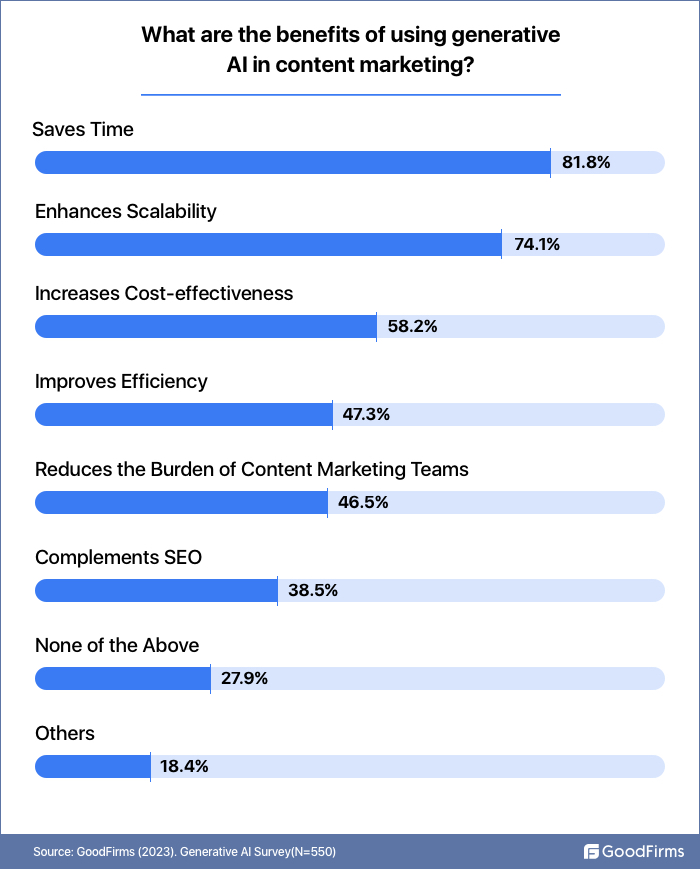
Saves Time
Incorporating generative AI in content marketing can save time, assert 81.8% of surveyees
Although it is not possible to rely completely on content generated by AI, it surely helps generate content faster.
Even if human efforts are essential for quality content creation, several tasks can be automated. Getting an outline created for an article and creating images or videos to add value to the marketing efforts with the help of machines can save considerable time for the marketing teams, which can be utilized for other strategic tasks.
Enhances Scalability
74.1% of the survey respondents said that generative AI could enhance content scalability
With its ability to create newer content at a great pace, generative AI can create high volumes of content in a short amount of time. Also, with appropriate training in the AI model, generative content can be personalized to individual needs.
The high amount of good quality content that can also be created in multiple languages can help increase the reach of the content and explore newer markets. Improving the market reach with personalized and quality content enhances the scalability of marketing efforts of content marketing teams.
Increases Cost-Effectiveness
58.2% of survey respondents believe that adopting generative AI for content marketing increases cost-effectiveness
Generating good and engaging content requires hiring quality content writers. With the emergence of generative AI can assist in creating content by hiring fewer or no content writers for certain assignments.
Generative AI is also of great aid for creating images and videos to enhance the quality of content. Although implementing sophisticated AI tools involves a significant cost, there are some tools that are less than hiring content writers. The reduction in the required costs of generating content has a positive impact on ROI.
Connor Hewson, Director of Assured Marketing Ltd. says, “With the help of AI, content creation workflows are expected to become more efficient and cost-effective, with tasks such as image and video generation being automated.”
Improves Efficiency
47.3% of survey respondents believe that generative AI can help improve the efficiency of content marketing efforts
Artificial intelligence is a great way to automate processes. Implementing generative AI can automate several day-to-day tasks associated with content marketing.
Generative AI can be employed in simplifying tasks like organizing content, creating FAQs for an article, and exploring ideas for new content that can reduce the required time. Automating tactical and tedious processes can improve the efficiency of marketing operations.
Reduces the Burden of Content Marketing Teams
46.5% of businesses said that using generative AI can reduce the burden of content marketing teams
With the several features of generative AI tools, they have the capability to automate multiple tasks. These tools are engineered to generate large amounts of content at a fast pace, allowing huge volumes of content in a short time period.
Automating day-to-day and tedious tasks associated with marketing efforts with the help of generative AI tools can free marketing team members to engage in other important projects. Employing generative AI tools can thus reduce the burden of content marketing teams.
Complements SEO
Using Generative AI in content marketing complements SEO, say 38.5% of surveyees
The performance of digital marketing efforts is largely impacted by SEO. Generative AI tools have a significant role to play in improving SEO-related tasks.
Jay Soni, Marketing Director, Yorkshire Fabrics Shop, says, “Generative AI can be used to improve existing content in order to increase engagement and search engine optimization. This can be accomplished by advising modifications to headlines, graphics, and keywords, among other things.”
Marketers can use generative AI tools to create a list of keywords, long-tail keywords. Tools like Chat GPT can assist in identifying potential websites that can offer backlink opportunities. These tools are also engineered to create Meta titles and meta descriptions for websites.
There are some other benefits that businesses can leverage when implementing generative AI in content marketing. Around 18.4% of surveyed businesses mentioned other benefits of using generative AI in content marketing other than the ones mentioned above. These benefits include improved customer experience, identifying newer trends, personalized content, etc. Generative AI has competencies to specifically tailor content for the target audience. It can also analyze previous patterns and popular content types to create the most relevant content for consumers, thereby enhancing their experiences.
Top Applications of Generative AI in Content Marketing
Artificial Intelligence has seen growth in its applications over the past years. Generative AI has brought in additional applications in almost every field. The content marketing sector has experienced several applications that have changed the way the industry works. Goodfirms’ survey attempts to get an idea of the top applications of generative AI in content marketing.
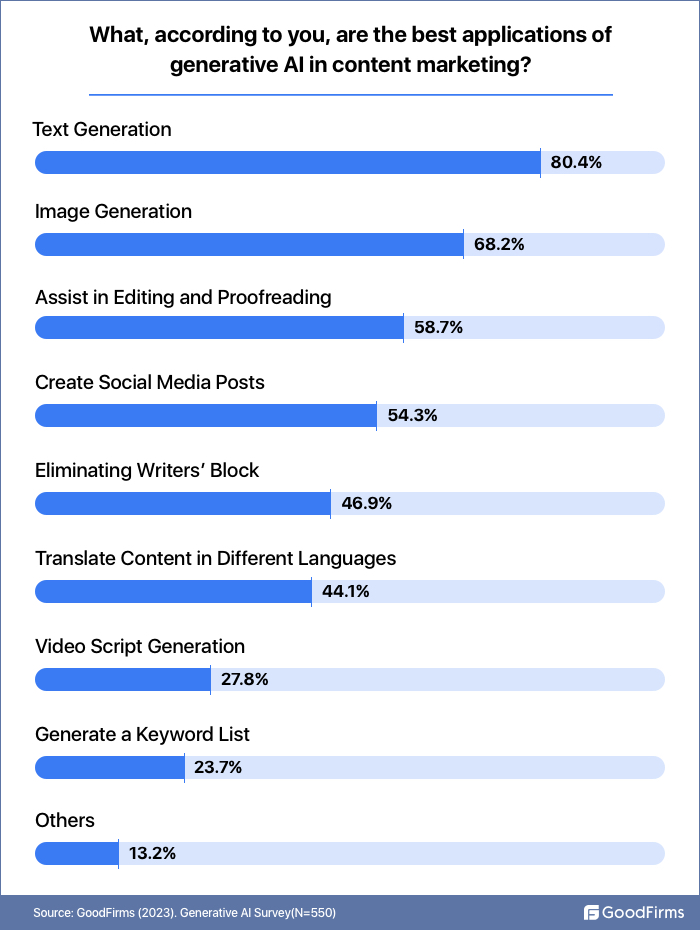
Text Generation
80.4% of businesses use generative AI, majorly for text generation applications.
The initial attempt of generative AI was to enhance or completely replace human written content. While saving a lot of time for marketing teams, generative AI tools can assist content creators in writing text forms like blogs, articles, social media posts, etc. SEO content to copy-writing, all of it can be written with the assistance of AI. With proper human intervention, the creation of text-based content is set to witness a change in the process.
Image Generation
Image generation is a major application of generative AI for 68.2% of surveyees.
Images form an important part of marketing content. Generating images that fit the requirement of a particular piece of content from scratch can be time-consuming. Moreover, if the images are 3D models of a product or design requirements, they generally require expert designers, which may lead to extra expenses.
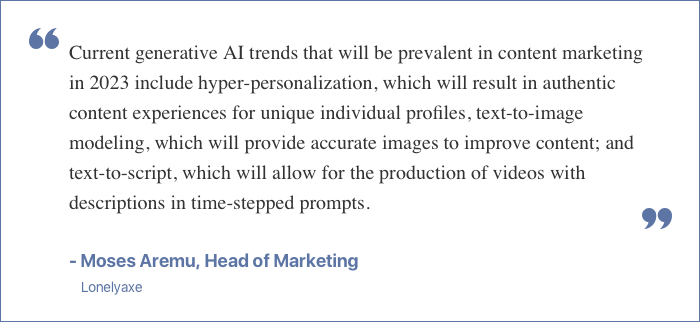
Image generation is a crucial application of generative AI, especially for startups or small businesses where there are budget constraints. The advent of tools like DALL-E from Open AI has made image generation easier and cost-effective. The generation of images from text prompts is one of the most tempting applications of generative AI.
Assist in Editing and Proofreading
58.7% of respondents believe that generative AI can be used for assisting in editing and proofreading.
While the focus of text-based generative AI tools is to help marketers create the first draft of the content, these tools can also help in editing and proofreading the final draft of a piece of content.
These tools work on improving the readability and correctness of the content with respect to grammar and sentence formation. Tools such as Grammarly have gained popularity in this section. The use of AI tools for editing and proofreading can help writers save time on reading and rewriting the content.
Create Social Media Posts
One of the top applications of generative AI is to create social media posts for 54.3% of businesses.
Social media marketing forms an integral part of digital marketing due to the diverse and large audience it can target. Creating social media posts might seem easy since the word count of these content copies is relatively small. However, it is challenging to create multiple versions of the copy suitable for various platforms.
Generative AI tools can assist social media marketers in thinking of headlines and even suggest some quotes as per the topic. With some overview and editing, AI-generated content can be made appropriate for brand voice and promotion. These tools can also help in creating replies to comments from customers or leads.
Eliminating Writer’s Block
46.9% of survey respondents think generative AI can be used to eliminate writer’s block.
Writer’s block is a phenomenon by even the most experienced writers. Facing writer’s block is quite frustrating. While there are tricks that can help writers overcome the block, which requires some time, generative AI is of great aid in doing so without requiring much time.
“In my opinion, getting beyond your writer's block is the greatest benefit of employing generative AI in content marketing.”, says Jamie Irwin, Digital Marketing Expert at TutorCruncher.
The ability of generative AI to create an outline for an article or the first draft of the article can give writers a breakthrough and save time. It can assist writers in writing on topics they are not experts at.
Translate Content in Different Languages
44.1% of the surveyees indicated that generative AI could be applied for translating content in different languages.
Translating marketing content becomes necessary when the target audience is diverse. Translating content into several languages becomes more important, especially when international markets are concerned.
There are certain generative AI tools that can help in content language translation in a short time without any grammatical errors.
Video Script Generation
27.8% of surveyed businesses use generative AI for video script generation.
Video advertising is unavoidable for promoting certain products or services. With the growing competition, it becomes necessary for brands to match market trends. Creating videos is a long and time-consuming process. Readily prepared video scripts are of great help in reducing the required time for creating videos.
There are numerous AI tools that create video scripts based on the input prompts that can help marketers save time and money.
Generate a Keyword List
23.7% of surveyees use generative AI to generate a keyword list.
Keyword research is an essential part of content marketing. Finding keywords that are better positioned for improving the SEO. Generative AI tools like ChatGPT can help marketers to create a list of keywords that are relevant to a topic.
These AI tools can help analyze competitor websites to create keywords and long-tail keyword lists better.
Other potential applications of generative AI mentioned by 13.2% of suryevees include suggesting titles based on the topics and content brief, generating names for products, creating multiple content versions for A/B testing of a website, creating landing pages, etc. With further advancements in AI models, generative AI will be potentially applied in several other ways.
Challenges Associated with Generative AI in Content Marketing
With the many developments in the field of artificial intelligence, generative AI is about to bring a revolution in the field of content marketing. However, there are certain challenges associated with the adoption of generative AI for content marketing purposes. The participants of the Goodfirms survey mentioned some of these challenges.
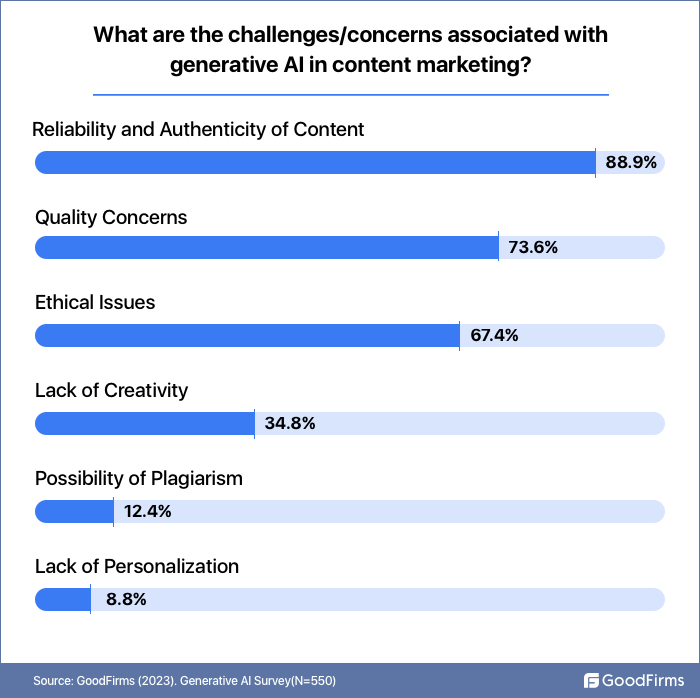
Reliability and Authenticity of Content
88.9% of businesses believe that reliability and authenticity of content are a challenge in adopting generative AI.
The data present at the disposal of the AI model decides the authenticity and reliability of the produced content. With the whole lot of data used to train the AI models, the content created may be irrelevant, unreliable, and inauthentic if the data is biased or inaccurate.
The authenticity of the content created is also concerning if the data is created with the intention of misleading the readers, which is most likely a possibility in the case of political campaigns or other propaganda.
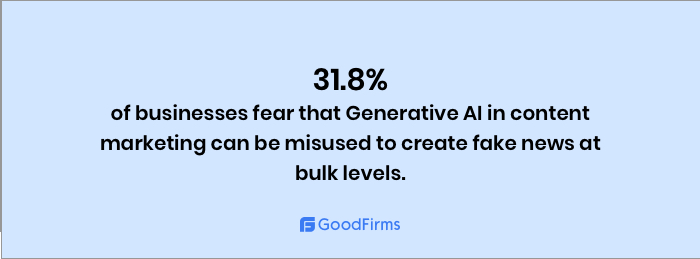
Quality Concerns
Quality concerns are a major challenge for 73.6% of businesses in using generative AI for content marketing.
“One of the drawbacks of utilizing generative AI for content promotion, in my view, is that it raises questions of originality and quality,” says Alex Contes, Co-founder and SaaS Expert of ReviewGrower
The content provided by Generative AI might seem attractive and unique. However, this content raises quality concerns.
The generative AI tools are designed to create new content from scratch based on the data used to train the AI model. Although the data is present on the internet, the quality of the data is questionable as there are several sources on the internet with irrelevant information.
Ethical Issues
Ethical issues with the generated content are a concern for 67.4% of businesses in implementing generative AI.
Generative AI models are trained on huge datasets, which enables them to create unique content every time. However, the datasets used to train these models may sometimes be biased, due to which the content created may not be satisfying.
Also, since the content is created based on the existing data, there are chances that the generated content is similar to the existing one. This may give rise to copyright and ownership issues.
With ethical issues in implementing generative AI, data security and privacy are also matters of concern that need to be addressed.
Lack of Creativity
34.8% of surveyees indicated that the content generated using AI lacks creativity.
Generative AI tools work to create new content on the basis of the data used to train deep learning models. However, these tools lack the ability to think of new ideas. The creativity and originality that is absent in the content created by these AI tools is a major drawback of them.
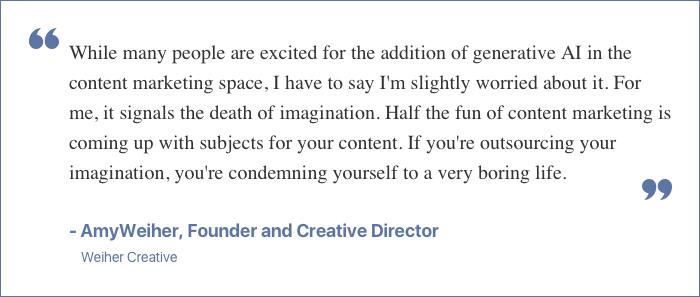
The creativity and uniqueness of a piece of content come from human imagination, which cannot be achieved in the content created by machines.
Possibility of Plagiarism
12.4% of respondents believe that the possibility of plagiarism is an issue while adopting generative AI.
With the AI models working on the data used to train them, there are chances that the content produced is plagiarized.
Although the content created by generative AI tools is paraphrased, the possibility of plagiarism is an issue that can make their adoption in content marketing problematic.
Lack of Personalization
8.8% of surveyees feel lack of personalization is a challenge in using generative AI in content marketing.
Digital marketing is all about giving the audience a personalized experience. Developing a loyal consumer base requires connecting with them, which can be accomplished by the human touch in the published content or even the body of the e-mails sent.
Chris Looney, CEO of SporesMD says, “AI-generated content may not always meet the standards of human-generated content, and there is a risk of losing the human touch in marketing.”
Although generative AI models are fed with humongous amounts of data, the content generated by machines lacks the emotions and human touch that human involvement can do. The adoption of these technologies, therefore, requires the involvement of humans to add the human touch or incorporate the brand voice into the content.
Future of Generative AI in Content Marketing
Businesses have been leveraging the benefits of generative AI to a certain extent. However, as the industry continues to mature further, there is a lot of potential for many more developments.
Andrew Forest, Owner of The Attachment Company, says, “I think that the future of generative AI in content marketing looks very promising. As AI technology continues to advance, it is likely that generative AI will become even more sophisticated and capable of generating even higher-quality content.”
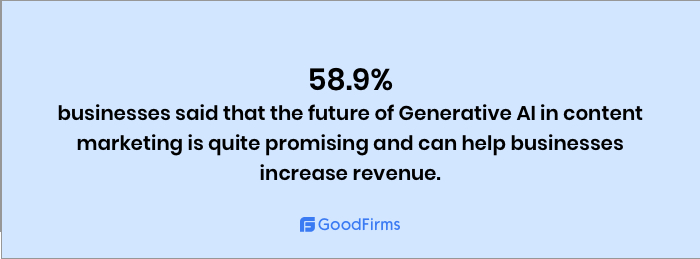
Improved Creativity
Generative AI models have seen tremendous growth in training datasets. The advancement of technology has led to the sophistication of machines. The pace of development, however, indicates that generative texts and images will assist in generating the content of much higher quality. The improved version of generative images will be capable enough to create even logos, symbols, and other high-quality visuals.(8)

The application of generative AI has the potential to create novel content for a good marketing strategy.
“Artificial intelligence can be used to make predictions about the types of content that will be popular with various audiences. Because of this, businesses may be able to produce content that is more useful and avoid squandering their time and money on content that is less likely to be successful.”, says Mark Lindquist, Head of Marketing at Community Phone
Furthermore, data analysis can assist marketers in creating useful and improved content that is consumed more by the target audience.
Text-to-Audio Generation
While generative text, images, and video have been explored by businesses, generating music by generative AI is an upcoming development in the marketing sector.
Researchers at Google have released a generative AI tool MusicLM which is capable of generating audio or music as an output of a text prompt.(9)
AI generative music has the potential to revolutionize the marketing industry. These tools will potentially assist in creating musical tunes, advertisement jingles, and even music for videos.(10)
Enhanced Customer Service
ChatGPT is an example of an artificial intelligence chatbot. Conversational bots are an emerging technology of generative AI. These conversational bots can be of great aid in the customer service sector. Trained with huge datasets, these bots can help companies achieve the goal of uninterrupted 24/7 customer service.
The advent of conversational bots or virtual assistants can improve the overall customer service experience. With the implementation of data analysis to study customer behavior, these artificial intelligence products would be capable of creating personalized experiences for the customers and even suggesting to them the products they have previously bought.(11)
Changing Workforce
Developing technologies has always been a concern about the replacement of humans in the concerned industry. The growing applications of generative AI have resulted in the speculations of humans being replaced by AI in creative jobs. Our research found that 43.9% of surveyees believe that the emergence of generative AI will reduce the need for human labor in the content marketing industry.
Although the usage of generative AI will result in reduced human efforts in creating content, experts believe that increased adoption of the technology will generate new jobs. AI will be used to augment the work of humans and not entirely replace humans. Moreover, jobs like editing and reviewing the content generated for the correctness of facts are other important tasks that need to be performed by humans. "In content marketing, AI helps in generating content in an efficient way, but I believe it lacks creativity. We need human resources to write something creative, says Shanza Riaz ofEritheia Labs.
It is also predicted that job profiles like prompt engineers that will specialize in giving appropriate prompts to the machine for generating accurate content will be created.(12)
“The widespread adoption of generative AI will bring about fascinating new prospects for individuals who are proficient in its use. Generative AI will usher in a plethora of new careers, much like the camera and record player did before it. Examples include the potential rise in the need for prompt engineers or those who are skilled at crafting description texts that prompt the desired outcomes from generative AI systems.”, says Mathew Magnante, Content Writer & Strategist at FitnessVolt.
Key Findings
- The advent of ChatGPT has led to a buzz around generative AI tools.
- Generative AI defines a broad category of artificial intelligence that is able to generate content in the form of text, images, videos, codes, and synthetic data from scratch.
- Some of the prominent generative AI models include Generative Adversarial Networks (GAN), Transformers-based models, Variational Auto Encoders (VAE), GPT-3, and GPT-4.
- The generative AI market is expected to grow with a CAGR of 34.6% to grow from USD 8.0 billion in the year 2021 to the year 2030.
- While North America is speculated to dominate the generative AI market, the media and entertainment industry is expected to be the major contributor.
- 45.3% of the surveyed businesses are expected to adopt generative AI for content creation, while 17.4% of businesses are already using it.
- The top text-based generative AI tools include CopyAI, JasperAI, Writesonic, and WordAI, to name a few.
- DALL-E2, MIdJourney, and Deep Dream Generator are some preferred choices of content creators of Image-based generative AI tools.
- Around 81.8% of survey participants said that the major benefit of using generative AI is that it saves time, while for 74.1% of businesses, it is the enhanced scalability.
- The major application of generative AI is text generation for 80.4%, while for 68.2% of businesses, it is image generation.
- Around 46.9% of businesses believe that generative AI assists them in eliminating writer’s block.
- The major challenge of adopting generative AI is the lack of reliability and authenticity of the generated data for 88.9% of businesses.
- Around 73.6% of the surveyed businesses believe that the quality of the generative content is a concern for them, whereas 67.4% of participants feel generative content has ethical issues.
- 58.9% of businesses said that the future of generative AI in content marketing is very promising.
- According to 43.9% of survey respondents believe that increased adoption of generative AI can reduce the need for human labor.
Conclusion
The emergence of generative AI in content marketing is evident from the increased capabilities of the newer models. Generative AI is here to stay and is about to change the way content marketing is carried out. It is advisable for businesses to stay updated on the current technologies and leverage their benefits. However, just relying on generative AI to produce content and publish it is not a good idea.
Investing time to edit the machine-generated content and incorporating human efforts to align it with the brand's voice can add to the value of the content. It is necessary for marketers to be mindful of the fact that the increased implementation of generative AI for content generation is expected to increase the amount of content that will be available on the internet, and the quality of the content, therefore, should not be compromised.
With the various benefits that generative AI can offer in the content creation process, digital content marketing is expected to see a revolution.
We sincerely thank our Research Partners for their valuable insights.
References
- https://www.techopedia.com/definition/34633/generative-ai
- https://openai.com/product/gpt-4
- https://www.grandviewresearch.com/industry-analysis/generative-ai-market-report#:~:text=The%20global%20generative%20AI%20market%20size%20was%20estimated%20at%20USD,is%20generative%20AI%20market%20growth%3F
- https://www.researchandmarkets.com/reports/5712535/generative-ai-market-size-share-and-trends
- https://www.acumenresearchandconsulting.com/generative-ai-market
- https://workspace.google.com/blog/product-announcements/generative-ai
- https://www.statista.com/outlook/dmo/digital-advertising/video-advertising/worldwide
- https://www.forbes.com/sites/forbesbusinesscouncil/2023/02/28/five-artificial-intelligence-predictions-for-the-near-future/?sh=424e6d5f5f18
- https://google-research.github.io/seanet/musiclm/examples/
- https://theconversation.com/text-to-audio-generation-is-here-one-of-the-next-big-ai-disruptions-could-be-in-the-music-industry-193956
- https://floatbot.ai/blog/impact-of-generative-ai-on-work-and-business
- https://www.peoplematters.in/article/talent-management/is-prompt-engineering-the-hottest-job-in-ai-today-37036
Table of contents
- Introduction
- Overview of Generative AI
- Survey and Data Analysis
- Generative AI in Content Marketing
- Benefits of Generative AI in Content Marketing
- Top Applications of Generative AI in Content Marketing
- Challenges Associated with Generative AI in Content Marketing
- Future of Generative AI in Content Marketing
- Key Findings
- Conclusion









